| Listing 1 - 10 of 42 | << page >> |
Sort by
|
Book
ISBN: 9780521199094 9780521153393 0521199093 0521153395 9780511973550 1139012622 9786613016041 1139011766 1139012029 1139010964 0511973551 1139011499 1283016044 1139011235 Year: 2011 Publisher: Cambridge Cambridge University Press
Abstract | Keywords | Export | Availability | Bookmark
 Loading...
Loading...Choose an application
- Reference Manager
- EndNote
- RefWorks (Direct export to RefWorks)
A guide to the techniques and institutions used to solve international disputes, how they work and when they are used. This textbook looks at diplomatic (negotiation, mediation, inquiry and conciliation) and legal methods (arbitration, judicial settlement). It uses many, often topical, examples of each method in practice to place the theory of how things should work in the context of real-life situations and to help the reader understand the strengths and weaknesses of different methods when they are used. It also looks at organisations such as the International Court and the United Nations and has been fully updated to include the most recent arbitrations, developments in the WTO and the International Tribunal for the Law of the Sea, as well as case law from the International Court of Justice.
Pacific settlement of international disputes --- Dispute settlement, Peaceful (International relations) --- Disputes, Pacific settlement of international --- International disputes, Pacific settlement of --- Peaceful dispute settlement (International relations) --- Peaceful settlement of international disputes --- PSD (Pacific settlement of international disputes) --- Settlement of international disputes, Pacific --- Dispute resolution (Law) --- International relations --- Law and legislation --- Arbitration, International. --- Intervention (International law) --- Mediation, International. --- Pacific settlement of international disputes. --- International relationsLaw and legislation --- Dispute resolution (Law). --- Intervention (International law). --- Dispute resolution (International law) --- Pacific resolution of international disputes --- Peaceful dispute resolution (International relations) --- Peaceful resolution of international disputes --- Resolution of international disputes, Pacific --- International law
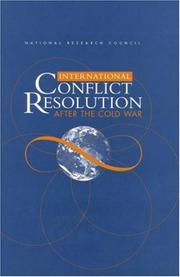
ISBN: 0309070279 030950127X 0309171733 9780309501279 9780309070270 0305070279 Year: 2000 Publisher: Washington, D.C. National Academy Press
Abstract | Keywords | Export | Availability | Bookmark
 Loading...
Loading...Choose an application
- Reference Manager
- EndNote
- RefWorks (Direct export to RefWorks)
International Relations --- Law, Politics & Government --- Pacific settlement of international disputes. --- Mediation, International. --- Conciliation, International --- International conciliation --- International mediation --- Mediation, International --- Mediation --- Arbitration (International law) --- Dispute resolution (International law) --- Dispute settlement, Peaceful (International relations) --- Disputes, Pacific settlement of international --- International disputes, Pacific settlement of --- Pacific resolution of international disputes --- Pacific settlement of international disputes --- Peaceful dispute resolution (International relations) --- Peaceful dispute settlement (International relations) --- Peaceful resolution of international disputes --- Peaceful settlement of international disputes --- PSD (Pacific settlement of international disputes) --- Resolution of international disputes, Pacific --- Settlement of international disputes, Pacific --- Dispute resolution (Law) --- International law --- International relations --- Law and legislation
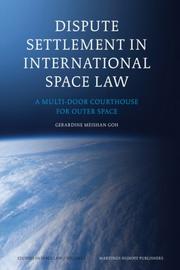
ISBN: 9789004155459 9004155457 9786611917265 1281917265 9047419464 9789047419464 Year: 2007 Volume: 2 Publisher: Leiden Boston Marinus Nijhoff Publishers
Abstract | Keywords | Export | Availability | Bookmark
 Loading...
Loading...Choose an application
- Reference Manager
- EndNote
- RefWorks (Direct export to RefWorks)
The existence of international law, with its rights, rules and regulations is futile without an effective enforcement mechanism that provides a sufficient and adequate remedy. International space law is particularly significant in the evolution of international dispute settlement because it involves a consideration of issues from an international and interdisciplinary perspective. These issues range from policies of regional and international organizations; to juridical dispute settlement and global governance; to fiscal entrepreneurship and business efficacy; and to scientific breakthroughs and technological advances. In this context, this book looks at an international and interdisciplinary approach in dealing with dispute resolution in space activities. It proposes a workable legal framework for dispute resolution in outer space, together with a mechanism for enforcement and verification.
Pacific settlement of international disputes. --- Space law. --- Pacific settlement of international disputes --- Space law --- Aerospace law --- Astronautics --- Space flight --- International law --- Aeronautics --- Dispute settlement, Peaceful (International relations) --- Disputes, Pacific settlement of international --- International disputes, Pacific settlement of --- Peaceful dispute settlement (International relations) --- Peaceful settlement of international disputes --- PSD (Pacific settlement of international disputes) --- Settlement of international disputes, Pacific --- Dispute resolution (Law) --- International relations --- Law and legislation --- Dispute resolution (International law) --- Pacific resolution of international disputes --- Peaceful dispute resolution (International relations) --- Peaceful resolution of international disputes --- Resolution of international disputes, Pacific
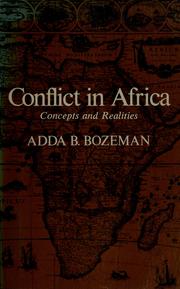
ISBN: 0691100446 0691031045 0691617201 1400867428 9781400867424 9780691617206 9780691031040 9780691100449 0691644357 Year: 2015 Publisher: Princeton, NJ
Abstract | Keywords | Export | Availability | Bookmark
 Loading...
Loading...Choose an application
- Reference Manager
- EndNote
- RefWorks (Direct export to RefWorks)
Do modern Western ideas about the nature of conflict and its resolution apply to Africa? To answer this question, Adda Bozeman examines conflict in Africa south of the Sahara in its many social, political, and cultural aspects, past and present.The author shows how African perspectives on war and diplomacy have evolved under the influence of nonliteracy, tribalism, and a concept of undifferentiated time. In addition, she confirms that indigenous cultural traditions are resurgent everywhere, making it unlikely that African political values will become more closely aligned with those of the West. The two civilizations view conflict differently and have different ways of resolving it. The Africans are more at ease with conflict than their Western counterparts, and they do not see war and peace as the mutually exclusive phenomena that Occidental societies hold them to be. The author concludes that modern Western concepts of conflict not only do not, but cannot, allow for African realities.Originally published in 1976.The Princeton Legacy Library uses the latest print-on-demand technology to again make available previously out-of-print books from the distinguished backlist of Princeton University Press. These editions preserve the original texts of these important books while presenting them in durable paperback and hardcover editions. The goal of the Princeton Legacy Library is to vastly increase access to the rich scholarly heritage found in the thousands of books published by Princeton University Press since its founding in 1905.
Social conflict --- Ethnology --- Pacific settlement of international disputes. --- Dispute settlement, Peaceful (International relations) --- Disputes, Pacific settlement of international --- International disputes, Pacific settlement of --- Pacific settlement of international disputes --- Peaceful dispute settlement (International relations) --- Peaceful settlement of international disputes --- PSD (Pacific settlement of international disputes) --- Settlement of international disputes, Pacific --- Dispute resolution (Law) --- International relations --- Class conflict --- Class struggle --- Conflict, Social --- Social tensions --- Interpersonal conflict --- Social psychology --- Sociology --- Law and legislation --- Africa --- Foreign relations --- Dispute resolution (International law) --- Pacific resolution of international disputes --- Peaceful dispute resolution (International relations) --- Peaceful resolution of international disputes --- Resolution of international disputes, Pacific --- International law
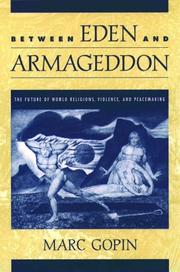
ISBN: 1280473177 9786610473175 019803069X 1282367021 9786612367021 0195348079 1423756924 9780198030690 9781423756927 9780195348071 0195157257 9780195157253 019513432X 9780195134322 0197738354 Year: 2002 Publisher: New York Oxford Oxford University Press
Abstract | Keywords | Export | Availability | Bookmark
 Loading...
Loading...Choose an application
- Reference Manager
- EndNote
- RefWorks (Direct export to RefWorks)
Marc Gopin offers an analysis of contemporary religious violence as a reaction to the pressures of modernity and the increasing economic integration of the world. He contends that religion is now one of the most likely causes of massive violence.
Pacific settlement of international disputes. --- Peace --- Violence --- Violence (in religion, folklore, etc.) --- Peace (Theology) --- Religion and peace --- Prayers for peace --- Dispute settlement, Peaceful (International relations) --- Disputes, Pacific settlement of international --- International disputes, Pacific settlement of --- Pacific settlement of international disputes --- Peaceful dispute settlement (International relations) --- Peaceful settlement of international disputes --- PSD (Pacific settlement of international disputes) --- Settlement of international disputes, Pacific --- Dispute resolution (Law) --- International relations --- Religious aspects. --- Moral and religious aspects --- Law and legislation --- Violence - Religious aspects - Christianity --- Conflict management - Religious aspects - Christianity --- Dispute resolution (International law) --- Pacific resolution of international disputes --- Peaceful dispute resolution (International relations) --- Peaceful resolution of international disputes --- Resolution of international disputes, Pacific --- International law --- Conflict management
Book
ISBN: 1282603108 9786612603105 9047427742 9789047427742 9781282603103 9789004174283 9004174281 6612603100 Year: 2009 Publisher: Leiden Boston Martinus Nijhoff Publishers
Abstract | Keywords | Export | Availability | Bookmark
 Loading...
Loading...Choose an application
- Reference Manager
- EndNote
- RefWorks (Direct export to RefWorks)
As China becomes more integrated in global economic and political systems, it has become inevitable that it engages fully and actively in the international legal system. Notably missing in China’s international engagement is its participation in international institutions on third party settlement of disputes, including territorial and boundary disputes. This work argues that, contrary to conventional understanding, much could be gained by China if it were to have a more positive attitude towards third-party settlement of its territorial and boundary disputes. This volume examines both the problems and opportunities China is confronting within the changing international context and offers new frameworks for settlement of China’s major territorial and boundary disputes.
Pacific settlement of international disputes. --- Dispute settlement, Peaceful (International relations) --- Disputes, Pacific settlement of international --- International disputes, Pacific settlement of --- Pacific settlement of international disputes --- Peaceful dispute settlement (International relations) --- Peaceful settlement of international disputes --- PSD (Pacific settlement of international disputes) --- Settlement of international disputes, Pacific --- Dispute resolution (Law) --- International relations --- Law and legislation --- China --- Boundaries. --- Foreign relations --- Dispute resolution (International law) --- Pacific resolution of international disputes --- Peaceful dispute resolution (International relations) --- Peaceful resolution of international disputes --- Resolution of international disputes, Pacific --- International law
Book
ISBN: 1501701266 1501701274 9780801453908 0801453909 9781501701276 9781501701269 Year: 2015 Publisher: Ithaca, NY
Abstract | Keywords | Export | Availability | Bookmark
 Loading...
Loading...Choose an application
- Reference Manager
- EndNote
- RefWorks (Direct export to RefWorks)
Why does soft power conflict management meet with variable success over the course of a single mediation? In Nested Security, Erin K. Jenne asserts that international conflict management is almost never a straightforward case of success or failure. Instead, external mediators may reduce communal tensions at one point but utterly fail at another point, even if the incentives for conflict remain unchanged. Jenne explains this puzzle using a "nested security" model of conflict management, which holds that protracted ethnic or ideological conflicts are rarely internal affairs, but rather are embedded in wider regional and/or great power disputes. Internal conflict is nested within a regional environment, which in turn is nested in a global environment. Efforts to reduce conflict on the ground are therefore unlikely to succeed without first containing or resolving inter-state or trans-state conflict processes. Nested security is neither irreversible nor static: ethnic relations may easily go from nested security to nested insecurity when the regional or geopolitical structures that support them are destabilized through some exogenous pressure or shocks, including kin state intervention, transborder ethnic ties, refugee flows, or other factors related to regional conflict processes. Jenne argues that regional security regimes are ideally suited to the management of internal conflicts, because neighbors that have a strong incentive to work for stability provide critical hard-power backing to soft-power missions. Jenne tests her theory against two regional security regimes in Central and Eastern Europe: the interwar minorities regime under the League of Nations (German minorities in Central Europe, Hungarian minorities in the Carpathian Basin, and disputes over the Åland Islands, Memel, and Danzig), and the ad hoc security regime of the post-Cold War period (focusing on Russian-speaking minorities in the Baltic States and Albanian minorities in Montenegro, Macedonia, and northern Kosovo).
Pacific settlement of international disputes. --- Conflict management --- Security, International --- Dispute settlement, Peaceful (International relations) --- Disputes, Pacific settlement of international --- International disputes, Pacific settlement of --- Pacific settlement of international disputes --- Peaceful dispute settlement (International relations) --- Peaceful settlement of international disputes --- PSD (Pacific settlement of international disputes) --- Settlement of international disputes, Pacific --- Dispute resolution (Law) --- International relations --- Conflict control --- Conflict resolution --- Dispute settlement --- Management of conflict --- Managing conflict --- Management --- Negotiation --- Problem solving --- Social conflict --- Crisis management --- Collective security --- International security --- Disarmament --- International organization --- Peace --- Law and legislation --- Dispute resolution (International law) --- Pacific resolution of international disputes --- Peaceful dispute resolution (International relations) --- Peaceful resolution of international disputes --- Resolution of international disputes, Pacific --- International law
Book
ISBN: 9004245901 9789004245907 1322343446 9781322343440 9789004245891 9004245898 Year: 2015 Publisher: Leiden Bosont
Abstract | Keywords | Export | Availability | Bookmark
 Loading...
Loading...Choose an application
- Reference Manager
- EndNote
- RefWorks (Direct export to RefWorks)
This book has emerged out of the author's experience as Director of an innovative peacemaking, peacekeeping and humanitarian initiative, the International Conference on the Former Yugoslavia, between 1992 and 1996. What was striking about this conference was the experiment of two full-time Co-Chairmen, one from the United Nations and one from the European Union, who laboured tirelessly for peace in different parts of the former Yugoslavia for three and a half years. The strategies and organization of the conference had to be pieced together from the start by the Co-Chairmen and their colleagues; only in retrospect could the question whether there might have been experiences of international peace conferences that might have been useful at the beginning of this process be reviewed. This research is contained in Part One of this book, which offers a review of the role of international peace conferences in history. Part Two contains a case study of the strategies and experiences of the International Conference on the Former Yugoslavia.
Pacific settlement of international disputes. --- Peace. --- Coexistence, Peaceful --- Peaceful coexistence --- International relations --- Disarmament --- Peace-building --- Security, International --- War --- Dispute settlement, Peaceful (International relations) --- Disputes, Pacific settlement of international --- International disputes, Pacific settlement of --- Pacific settlement of international disputes --- Peaceful dispute settlement (International relations) --- Peaceful settlement of international disputes --- PSD (Pacific settlement of international disputes) --- Settlement of international disputes, Pacific --- Dispute resolution (Law) --- Law and legislation --- Dispute resolution (International law) --- Pacific resolution of international disputes --- Peaceful dispute resolution (International relations) --- Peaceful resolution of international disputes --- Resolution of international disputes, Pacific --- International law
Book
ISBN: 1501704060 1501704079 9781501702471 1501702475 9781501704079 9781501704062 Year: 2016 Publisher: Ithaca, NY
Abstract | Keywords | Export | Availability | Bookmark
 Loading...
Loading...Choose an application
- Reference Manager
- EndNote
- RefWorks (Direct export to RefWorks)
In Peacemaking from Above, Peace from Below, Norrin M. Ripsman explains how regional rivals make peace and how outside actors can encourage regional peacemaking. Through a qualitative empirical analysis of all the regional rivalries that terminated in peace treaties in the twentieth century-including detailed case studies of the Franco-German, Egyptian-Israeli, and Israeli-Jordanian peace settlements-Ripsman concludes that efforts to encourage peacemaking that focus on changing the attitudes of the rival societies or democratizing the rival polities to enable societal input into security policy are unlikely to achieve peace.Prior to a peace treaty, he finds, peacemaking is driven by states, often against intense societal opposition, for geostrategic reasons or to preserve domestic power. After a formal treaty has been concluded, the stability of peace depends on societal buy-in through mechanisms such as bilateral economic interdependence, democratization of former rivals, cooperative regional institutions, and transfers of population or territory. Society is largely irrelevant to the first stage but is critical to the second. He draws from this analysis a lesson for contemporary policy. Western governments and international organizations have invested heavily in efforts to promote Israeli-Palestinian and Indo-Pakistani peace by promoting democratic values, economic exchanges, and cultural contacts between the opponents. Such attempts to foster peace are likely to waste resources until such time as formal peace treaties are concluded between longtime adversaries.
International relations --- Peace-building. --- Pacific settlement of international disputes. --- Building peace --- Peacebuilding --- Conflict management --- Peace --- Peacekeeping forces --- Dispute settlement, Peaceful (International relations) --- Disputes, Pacific settlement of international --- International disputes, Pacific settlement of --- Pacific settlement of international disputes --- Peaceful dispute settlement (International relations) --- Peaceful settlement of international disputes --- PSD (Pacific settlement of international disputes) --- Settlement of international disputes, Pacific --- Dispute resolution (Law) --- History --- Law and legislation --- Dispute resolution (International law) --- Pacific resolution of international disputes --- Peaceful dispute resolution (International relations) --- Peaceful resolution of international disputes --- Resolution of international disputes, Pacific --- International law
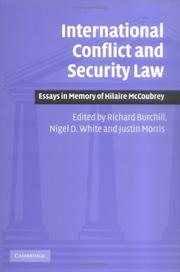
ISBN: 1107152062 1280422173 0511182376 0511199856 0511126328 0511300379 0511495137 0511125461 9780511126321 9780511125461 9780511495137 9780521845311 0521845319 9781280422171 0521845319 Year: 2005 Publisher: Cambridge, UK New York Cambridge University Press
Abstract | Keywords | Export | Availability | Bookmark
 Loading...
Loading...Choose an application
- Reference Manager
- EndNote
- RefWorks (Direct export to RefWorks)
Hilaire McCoubrey wrote extensively in the area of armed conflict law, and on the issues of collective security law and the law relating to arms control. Although he died at the early age of 46 in 2000 he had contributed significantly to the separate study of these areas, but also to the idea of studying the issues as a whole subject. The collection covers difficult and controversial issues in the area of conflict and security law. The contributors, drawn both from academe and practice, provide expert analysis of many aspects of the law governing armed conflict and collective security. As well as providing a fitting tribute to the main aspects of Hilaire's contribution to knowledge, the volume provides a coherent reconsideration and development of key aspects of conflict and security law at a time when that law is being applied, breached, debated or reformed on almost a daily basis.
Pacific settlement of international disputes. --- Security, International. --- Collective security --- International security --- International relations --- Disarmament --- International organization --- Peace --- Dispute settlement, Peaceful (International relations) --- Disputes, Pacific settlement of international --- International disputes, Pacific settlement of --- Pacific settlement of international disputes --- Peaceful dispute settlement (International relations) --- Peaceful settlement of international disputes --- PSD (Pacific settlement of international disputes) --- Settlement of international disputes, Pacific --- Dispute resolution (Law) --- Law and legislation --- McCoubrey, H., --- McCoubrey, Hilaire, --- Security, International --- Law --- General and Others --- Dispute resolution (International law) --- Pacific resolution of international disputes --- Peaceful dispute resolution (International relations) --- Peaceful resolution of international disputes --- Resolution of international disputes, Pacific --- International law
| Listing 1 - 10 of 42 | << page >> |
Sort by
|

 Search
Search Feedback
Feedback About UniCat
About UniCat  Help
Help News
News